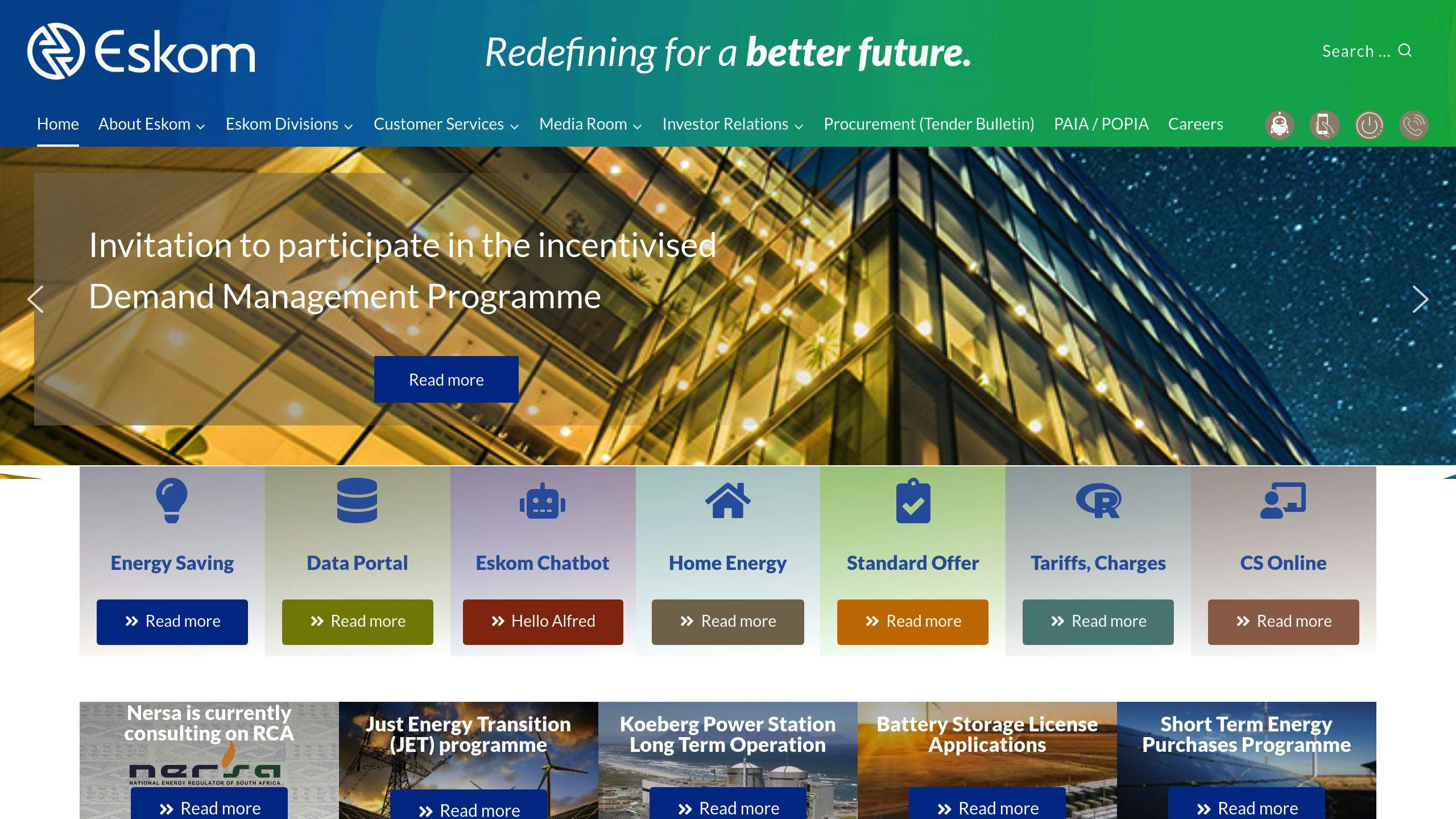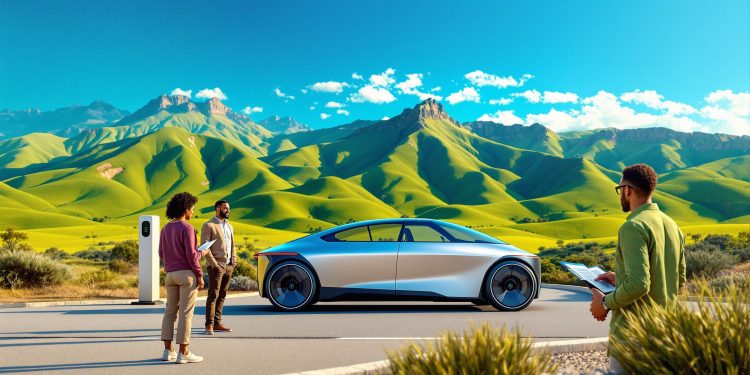Electric vehicles (EVs) in South Africa currently produce 17%-64% more CO2 than petrol cars due to the country’s reliance on coal-powered electricity. Despite this, 40% of South Africans are considering buying EVs within five years, driven by environmental concerns and shifting preferences. However, challenges like load-shedding, limited charging infrastructure, and misconceptions about costs slow adoption.
Key Points:
- Coal Dependency: Charging EVs on South Africa’s coal-heavy grid increases emissions.
- Lifecycle Emissions: EVs emit more CO2, SOx, and NOx than internal combustion vehicles (ICVs) due to coal use and battery production.
- Hybrid Advantage: Hybrids cut CO2 emissions by 30% and are more practical until cleaner energy is available.
- Charging Behavior: Off-peak or renewable-based charging reduces emissions significantly.
- Infrastructure Gaps: 70% of potential buyers cite insufficient public charging stations as a major barrier.
Quick Comparison:
| Vehicle Type | Current Emissions Impact | Practicality in South Africa |
|---|---|---|
| EVs | 17%-64% higher CO2 | Limited by coal-heavy grid |
| Hybrids | 30% lower CO2 | Better short-term option |
| ICVs (Petrol/Diesel) | Lower lifecycle emissions currently | Widely used but polluting |
To make EVs viable, South Africa must modernize its grid, expand charging infrastructure, and educate consumers on sustainable charging practices.
Lifecycle Emissions of EVs in South Africa
1. Comparing EVs and Internal Combustion Vehicles
Research indicates that EVs charged using South Africa’s electricity grid tend to produce more emissions than traditional internal combustion vehicles (ICVs), largely due to the country’s reliance on coal for electricity. Here’s a breakdown of the emission differences:
| Emission Type | EV vs ICV Comparison |
|---|---|
| CO2 | 17-64% higher in EVs |
| SOx | 35-50 times higher in EVs |
| NOx | 2-6 times higher in EVs |
| Particulate Matter | 2x higher than diesel ICVs |
2. Factors Affecting EV Lifecycle Emissions
The main reason EVs in South Africa have higher lifecycle emissions is the country’s heavy dependence on coal for electricity, combined with the use of poor-quality coal in power plants [2]. Additionally, producing EV batteries generates a significant amount of emissions even before the vehicle is operational, adding to the overall impact during the manufacturing phase [2].
Given these challenges, hybrid vehicles present a more practical option for now. They can cut CO2 emissions by about 30% compared to traditional petrol vehicles, making them a better choice while South Africa works toward cleaner energy sources [2]. For EVs to have a meaningful environmental advantage, the country must significantly reduce its coal dependency [2].
Beyond the electricity grid’s carbon intensity, how consumers use and charge EVs also plays a crucial role in determining their overall emissions.
Impact of Consumer Behavior on EV Emissions
Charging Habits and Emissions
How people charge their electric vehicles (EVs) in South Africa plays a big role in determining their emissions impact. Charging during peak hours – when coal-fired power plants are running at full capacity – leads to much higher emissions.
Here’s a quick breakdown of how charging behavior impacts emissions:
| Charging Behavior | Relative Emissions Impact | Contributing Factors |
|---|---|---|
| Peak Hour Charging | Highest Emissions | Heavy reliance on coal, high electricity demand |
| Off-Peak Charging | Moderate Emissions | Lower grid load, improved energy mix |
| Renewable Source Charging | Lowest Emissions | Cleaner energy sources, minimal grid strain |
In addition to charging habits, how consumers perceive EVs and their level of awareness also influence the environmental outcomes of EV adoption.
Environmental Awareness in Buying Decisions
South African consumers’ environmental awareness has a complex link to EV adoption. While many express a desire to lower their carbon footprint, practical issues often influence their choices.
For instance, misconceptions about EV costs and infrastructure challenges often push buyers toward hybrids. A common misunderstanding is that EV charging costs are on par with fuel expenses [1][3]. This belief, coupled with concerns about charging infrastructure, directly impacts both purchase decisions and how EVs are used.
"Almost three-quarters of surveyed consumers cited load shedding and insufficient charging infrastructure as major concerns" [1][3].
To reduce emissions and make EVs more appealing, South Africa must address grid reliability and expand charging options. Educating consumers on cost-effective charging practices and the environmental advantages of EVs is key to aligning consumer habits with emissions reduction goals.
Potential for Emissions Reduction and Future Scenarios
Estimated Emissions Savings from EV Adoption
By 2030, electric vehicles (EVs) could cut CO2 emissions by up to 31% compared to petrol-powered cars – if South Africa upgrades its coal-heavy energy grid. Right now, EVs in the country generate 17%-64% more CO2 than internal combustion vehicles due to heavy reliance on coal. This highlights the pressing need for cleaner energy sources [2].
Behavioral Scenarios and Emissions Impact
South Africa’s ability to reduce automotive emissions hinges on three main scenarios:
| Scenario | Emissions Reduction Potential | Key Actions Needed |
|---|---|---|
| Hybrid Transition | 30% CO2 reduction | Widespread adoption of hybrid vehicles |
| Grid Modernization | Lower SOx and NOx emissions | Invest in advanced power plant tech |
| Renewable Charging | Major emissions decrease | Expand solar and wind energy use |
Hybrid vehicles provide an immediate way to cut emissions, delivering a 30% CO2 reduction while renewable energy systems are being built [2]. However, the choices consumers make – like when and how they charge their vehicles – will play a big part in turning these scenarios into measurable emissions cuts.
To make a real difference, South Africa must focus on both technological upgrades and changing consumer habits. While EVs can reduce particulate emissions, they won’t become a truly low-carbon option until cleaner energy sources and modern power technologies are in place. Encouraging off-peak charging and ramping up renewable energy adoption are key steps toward making EVs a better choice for eco-conscious drivers.
Tackling these challenges will need a mix of smart policies and market-driven solutions, which we’ll dive into further in the next section.
sbb-itb-09752ea
Recommendations for Policy and Market
Review of Current Government Initiatives
South Africa’s EV policy needs practical solutions to tackle hurdles like grid instability and insufficient infrastructure. Nearly half of motorists don’t have a public charging station within 20km, highlighting a major infrastructure shortfall [1][3].
| Challenge | Impact on EV Adoption | Suggested Policy Action |
|---|---|---|
| Grid Instability | 75% worry about load shedding | Upgrade and modernize the grid |
| Limited Charging Network | 70% held back by lack of access | Boost public-private partnerships for funding |
| High Initial Costs | Limits affordability | Offer purchase incentives |
Suggestions for Promoting EV Growth
To drive EV adoption and reduce emissions, several focused actions are necessary:
-
Expand Infrastructure
Build fast-charging stations in urban hubs and along busy routes. Shopping centers and office areas are ideal locations to meet high demand. -
Upgrade the Grid and Integrate Renewables
South Africa’s coal-dependent grid means EVs currently emit 17-64% more CO2 than traditional vehicles [2]. To address this:- Implement tax breaks for renewable energy systems and time-of-use tariffs to promote off-peak charging.
- Invest in grid upgrades to better integrate cleaner energy sources.
-
Educate and Inform Consumers
- Launch campaigns to highlight EV advantages and explain charging options.
- Share clear comparisons of home charging costs versus fuel expenses.
- Partner with manufacturers on educational initiatives.
- Teach consumers how off-peak charging and renewables can lower EV-related emissions.
Fixing grid issues and addressing load shedding are essential to building trust among potential EV buyers. While 40% of South Africans are considering EVs within the next five years [1][3], turning this interest into action requires teamwork between the government and private sector.
South Africa’s Eskom launches several electric vehicle charging stations

Conclusion: Aligning Behavior with Emissions Goals
South Africa faces distinct hurdles in adopting EVs due to its reliance on coal for electricity. This dependency means EVs currently generate more CO2 emissions than traditional vehicles, making it crucial to tackle both infrastructure issues and consumer habits to lower emissions effectively.
Charging habits and the rising interest in EVs highlight the need to resolve grid instability and emissions concerns. Grid reliability is a significant factor influencing both purchasing and charging decisions for potential EV users.
Targeted changes in behavior and infrastructure improvements could significantly cut EV-related emissions:
| Behavior Change | Impact on Emissions |
|---|---|
| Off-peak Charging | Lessens grid strain and decreases emissions |
| Renewable Energy Usage | Could lower EV emissions to 69% of petrol cars by 2030 |
| Hybrid Vehicle Adoption | Offers reduced emissions as infrastructure evolves |
To achieve meaningful progress, South Africa must focus on two key areas: upgrading its energy grid and encouraging smarter consumer habits. This means investing in renewable energy, building reliable charging networks, and educating users on effective charging practices. Aligning consumer actions with emissions goals will be key to making EV adoption more sustainable.
Overcoming these challenges will require a unified effort, as further detailed in the recommendations section.
Related Blog Posts
- Fuel-Saving Tips for Long South African Road Trips
- Top 5 Cars for South African Roads
- SA EV Sales Growth 2025: Key Numbers
- Luxury Car Market in South Africa: 2025 Price Forecast





